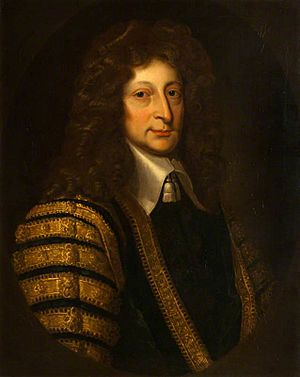Archibald Primrose, Lord Carrington facts for kids
Sir Archibald Primrose, 1st Baronet, known as Lord Carrington (born May 16, 1616 – died November 27, 1679), was an important Scottish lawyer, judge, and a strong supporter of the King, known as a Cavalier.

Archibald was the oldest son of James Primrose, who was a solicitor. When his father passed away in 1641, Archibald took over his father's job as the Clerk to the Privy Council. This council was a group of important advisors to the King.
Contents
A Loyal Supporter of the King
Archibald Primrose was very loyal to the King during a time of great change in Scotland and England.
Joining the Royalists
After a big battle called Kilsyth, Archibald joined Montrose, who was leading the King's forces. However, he was captured at the Battle of Philiphaugh in 1645.
Facing Challenges
Archibald was put on trial and found guilty of treason, which is a very serious crime against the government. Luckily, a powerful person called the Marquess of Argyll helped him, and he was saved from being put to death.
After he was released in 1646, King Charles I made him a knight. Later, he joined King Charles II and was given the special title of Baronet in 1651. This happened during the King's march towards the Battle of Worcester.
Losing and Regaining His Position
Because of his strong loyalty to the King, Archibald faced difficulties. His property was taken away, and he was removed from his job by a law called the Act of Classes.
But things changed! When this law was cancelled, and he showed he was still a good member of the Church, he was allowed to hold public office again in 1651. He was then appointed Clerk to the Committee of Estates.
Important Roles in Government
When the King was restored to power in England (this is called the Restoration), Archibald Primrose was given many important jobs.
High-Ranking Appointments
In 1660, he became the Lord Clerk Register, which was a very important role in charge of public records. In 1661, he was made a Lord of Session, which meant he was a judge, and he was given the title Lord Carrington. At the same time, he also became a Lord of Exchequer (dealing with money matters) and a Privy Counsellor (an advisor to the King).
He also played a big part in creating an important law called the Rescissory Act 1661. This law changed how the Church was organized in Scotland for a while.
Facing Rivalry
Later, a powerful person called the Duke of Lauderdale became his rival. Because of this rivalry, Archibald had to give up his jobs as Lord of Exchequer and Lord Clerk Register in 1676. He took on a less powerful job as Lord Justice General, but he was even removed from that position in 1678.
Later Life and Legacy
Sir Archibald Primrose passed away in November 1679 and was buried in Dalmeny church. He and his father together served the Crown for almost 100 years.
His oldest son, William, took over his title as Baronet. William's son, James, later became the Viscount of Primrose. Archibald's fourth son, also named Archibald, became the Earl of Rosebery in 1703. This younger Archibald was an ancestor of a future Prime Minister, Archibald Primrose, 5th Earl of Rosebery.
See Also
Images for kids
 | Anna J. Cooper |
 | Mary McLeod Bethune |
 | Lillie Mae Bradford |


